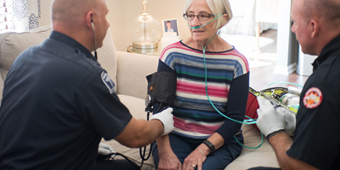Protect Yourself from the Health Risks of Menopause

Answer a few questions and we'll provide you with a list of primary care providers that best fit your needs.
Decreasing amounts of the hormone estrogen during menopause may contribute not only to menopausal symptoms but to more serious health conditions. “Two of the biggest concerns for postmenopausal women are heart disease/stroke and bone loss,” says Rashmi Bolinjkar, MD, Upper Valley Women's Center. “Signs of these conditions may not appear until a serious event occurs, such as a heart attack or a broken hip bone.”
Understand your risk so you can take steps to protect yourself.
Increased Risk for Heart Disease and Stroke
Until you reach menopause, estrogen in your body helps to lower “bad” cholesterol (LDL) and increase “good” cholesterol (HDL). As estrogen decreases, so does this protective effect. Taking hormone therapy to replace estrogen does not seem to have the same positive effect as the estrogen that your body naturally produces.
“There are steps you can take, however, to keep your heart and blood vessels healthy. Avoid smoking, maintain a healthy weight, and if you have diabetes or high blood pressure, follow your treatment plan,” says Dr. Bolinjkar.
In addition, regular exercise and a heart-healthy diet promote a strong heart and help guard against clogged blood vessels.
Get regular checkups to make sure your blood cholesterol (a fatty substance in the blood) is below 200 mg/dL (milligrams per deciliter), blood pressure is 120/80 or lower, and fasting blood sugar is less than 100 mg/dL.
Dr. Bolinjkar advises you to also be on the alert for metabolic syndrome, a group of conditions that put you at risk for heart disease and diabetes. These include obesity, low HDL cholesterol level (the “good” cholesterol), high blood sugar, high blood pressure and inability to use insulin effectively in the body.
“Having only one of these signs can put you at risk for heart disease or for diabetes. If you have at least three of these, you have metabolic syndrome,” says Dr. Bolinjkar.
Exercising, eating a heart-healthy diet and weight control all help prevent or reverse metabolic syndrome. This, in turn, will lower your risk for heart disease, stroke or type 2 diabetes, all major causes of illness and death in older women.
Bone Loss
Until a woman turns 30, her body builds bone; after age 30, bone breaks down faster than it is replaced. “Mild bone loss will not cause problems, but when the loss becomes excessive, bones weaken and fractures occur,” says Dr. Bolinjkar. “Since estrogen plays an important role in building new bone, decline of the hormone during menopause contributes to bone loss.”
Osteoporosis is a condition in which bones become very weak and can break easily. Up to half of American women over age 50 are likely to have a broken bone at some point due to osteoporosis. The crack may occur with just a strain, twist or strong cough, most often in the wrist or spine. Repeated small breaks in the spine can lead to curvature of the spine, loss of height and pain. A fall can lead to a hip fracture, which can jeopardize a woman’s independence.
Factors that put you at risk for developing osteoporosis include:
- A family history of osteoporosis
- A broken bone while an adult
- Removal of both ovaries before natural menopause
- Early menopause
- Long-term calcium deficiency
- Extended bed rest
- Smoking
- Long-term heavy drinking
- Long-time use of certain medicines, such as glucocorticoids or some anticonvulsants
- Having a thin, small body frame
Key steps in building bone in early years and maintaining strength in later years include regular weight-bearing exercise and eating a healthy diet rich in calcium and vitamin D. Getting five to 30 minutes of outdoor sunlight twice a week also helps your body make vitamin D.
Lifestyle changes also help protect your bones, says Dr. Bolinjkar. “If you smoke, stop. Also, limit alcohol consumption, which contributes to a number of health problems and may make you more prone to falling.”
“Two of the biggest concerns for postmenopausal women are heart disease/stroke and bone loss.”
All women over age 65 should have a DEXA (dual-energy X-ray absorptiometry) scan to test for bone density. If you have any of the risk factors described above, ask your doctor at what age you should be scanned. The scan focuses in particular on the hip and spine.
If lifestyle improvements are not enough to strengthen your bones, your doctor may prescribe medication to build up bone density or prevent further bone loss.
Urinary Problems
Frequent urinary tract infections (UTIs) and urine leakage — called urinary incontinence — may develop at the same time you are experiencing menopause. They are not necessarily related to menopause. UTIs and incontinence are both treatable, so see your doctor for help with controlling these problems.
Muscle weakness, nerve damage and infection all may contribute to urinary incontinence. Solutions include bladder control training, medication, implants to support pelvic structures and surgery.
Learn more! Search our site for more information on bladder and pelvic health.
Answer a few questions and we'll provide you with a list of primary care providers that best fit your needs.
Source: National Institute on Aging; Rashmi Bolinjkar, MD, Upper Valley Women's Center




